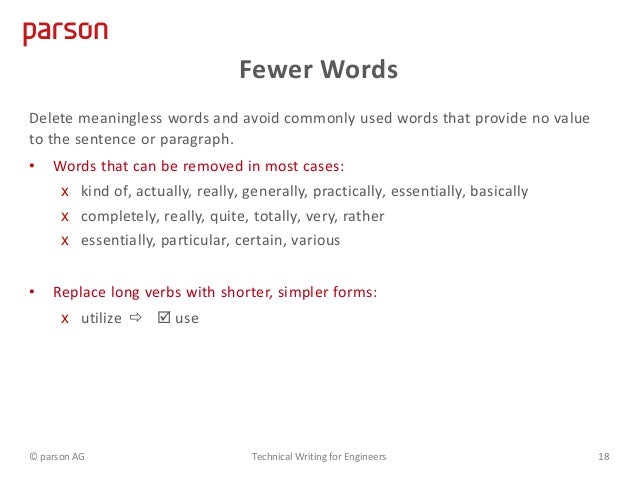
12/10/ · In engineering, technical writing or editing helps engineers present essential information in a clear and concise manner. Improving your technical writing will lead to smoother operations within your business, clearer training for employees, and a better business relationship with clients and project stakeholders practice with your documents (commonly written by engineers - weekly reports, white papers, engineering/equipment specifications, equipment capital justifications, standard operating procedures, operating instructions, guidelines, equipment/plant outage reports, system descriptions, design criteria, inspection reports) 11/17/ · Technical Writing for Engineers Tip 2: Determine your audience. Knowing who will be using or reading your document greatly affects how you put it together. Engineers, investors, operators—they all require different information, and shaping your documents to give each user the greatest opportunity for quick understanding and comprehension saves them and you both time and
Technical Writing For Engineers (and others) | Vista Projects
As an engineer, you need to frequently communicate with others through writing. Whether you need to explain the installation of equipment, operation of a facility, or maintenance of a component, it is critical to be able to deliver simple, clearly-worded directions. Or, maybe you find yourself striving to justify a design element to convince an investor. You must be able to methodically balance background information with the key points that your audience is seeking.
Regardless of your reason for writing, how effectively you can get the message across to the end user depends on your writing skills. After more than 23 technical writing for engineers of supporting engineers in developing and revising their documents, technical writing for engineers have a few tips you can use to help improve your writing.
Technical Writing for Engineers Tip 1: Recognize the consequences of your communication. Writing is a task that can often feel abstract and distant from work that has a more observable impact. Or, in other cases, the process of writing may appear daunting due to the sheer scale and demands on your time. As you sit down at the keyboard, or pick up a pen to edit, it is essential to keep in mind the objectives and real-world effects of your communication.
Ask yourself what could happen if this task were done poorly? Could missing details lead to misuse of a device and cause poor performance? Would technical writing for engineers reflect back on you as a professional, or result in your company losing business? Is there a chance that lack of clarity could even lead to damages, injuries, or preventable deaths? No matter how minor or extreme, there are always consequences for how communication is received, and the end user of each document is directly depending on your knowledge and input to experience the best possible outcomes.
Knowing who will be using or reading your document greatly technical writing for engineers how you put it together. Engineers, investors, operators—they all require different information, and shaping your documents to give each user the greatest opportunity for quick understanding and comprehension saves them and you both time and money. The most often missed tip we can provide in technical writing for engineers is to invest some time into figuring out the audience, which then leads to tip three.
That means developing documentation that is fit-for-purpose and written specifically for your end user. Consider these situations:. Did you notice something different in the last example? If so, you deserve some brownie points.
A very subtle, technical writing for engineers, but important note to consider is that even a single audience may have different needs at different times, and your writing should be designed to account for that. And speaking of design. Taking time to create a coherent design for your writing is as crucial as following a building plan or machining specification. It is absolutely fine to start your writing with a verbal brain dump to lay out a few ideas on the page, but without organizing your ideas into an outline afterwards, you may as well stack timber, shingles, and wiring in a pile and hope it miraculously turns into a house, technical writing for engineers.
The flow of your ideas must be intentional, and the words you use to express them must be precise. Every form of writing from an email to a scientific paper should follow a logical development. Knowing your audience, determine what is most helpful for them to understand the information: should events be described chronologically?
Do they need to know important information immediately before anything else? Is there a sequence of steps they need to follow in a particular order?
It may be tempting to breeze past this phase to save time, but a well-composed plan will benefit both you and your audience by establishing a stable framework for your writing. After you finish the first draft of your writing, technical writing for engineers, take some time to reread the content to ensure it is understandable, accessible, and appropriate for your target audience. Try to check for patterns: are the directions phrased similarly?
Is the voice and level of detail consistent? Is the same terminology used across definitions and descriptions? Once your review is done, technical writing for engineers, seek the opinions of other writers or engineers to help verify the accuracy of your information and point out any potential technical writing for engineers or additions, technical writing for engineers.
Have the reviewer briefly summarize your writing back to you, and ensure they understood the message the way you intended to communicate it. If their summary is off base, consider ways to clarify, simplify, or reinforce your meaning so that the intent is easy to grasp on the first readthrough. After your work is sent, submitted, or published, it can be difficult or impossible to correct any mistakes. So, invest upfront in your attention to detail, and recruit resources in your network to help finalize your content with confidence.
If you are looking to expand your network for more support in technical writing, revising, or training tips on any of these topics, check out our other blogs and free Learning Center : or bring your questions and contact us directly!
Skip to content. Facebook page opens in new window Twitter page opens in new window Linkedin page opens in new window Yelp page opens in new window YouTube page opens in new window. com Monday — Thursday 8 AM — 5 PM: Friday 8 AM - 12PM CST. Technical Writing for Engineers. Nov 17 Technical Writing for Engineers Tip 2: Determine your audience. Technical Writing for Engineers Tip 3: Write for the audience.
Consider these situations: Are you writing a paper for an engineering publication? Are you preparing information for an investor? Then you are probably appealing to someone without an engineering background, and they need to know specifics without too much detail or an abundance of technical jargon.
Are you writing a document to explain operation of a facility? In that case, it is best to focus on what the operator needs to do and how to accomplish it in an equipment startup procedure, whereas a facility training manual should explain more about why certain processes are occurring, technical writing for engineers.
Technical Writing for Engineers Tip 4: Design your document. Technical Writing for Engineers Tip 5: Review, technical writing for engineers, review. and review. Categories: Business WritingTechnical Writing November 17, Tweet Share on Twitter Pin it Share on Pinterest Share on Facebook Share on Technical writing for engineers Share on LinkedIn Share on LinkedIn Share on WhatsApp Share on WhatsApp. Previous Previous post: The Need for Training Documentation in the Alternative Energy Industry Next Next post: Benefits of Standard Operating Procedures SOPs.
More Articles. Tips To Improve your Technical Writing Skills April 12, The Basics of Biogas: An Up-and-Coming Industry March 17, Celebrating National Grammar Day and National Proofreading Day March 1, Training Customers is a Vital Step in Customer Relationships February 8, National Thesaurus Day January 25, Benefits of Standard Operating Procedures SOPs January 13,
The Joy of Docs: Technical Writing for Developers and Engineers by Dana Scheider
, time: 31:28Technical Writing for Engineers [The Ultimate Guide & Course]

11/17/ · Technical Writing for Engineers Tip 2: Determine your audience. Knowing who will be using or reading your document greatly affects how you put it together. Engineers, investors, operators—they all require different information, and shaping your documents to give each user the greatest opportunity for quick understanding and comprehension saves them and you both time and Technical Writing for Engineers [The Ultimate Guide & Course] Challenges versus Benefits. An engineer is a writer. Or, at least, they should be a writer. Communicating technical Challenge #1: Communicating Technical Knowledge. If you’ve ever wondered why your boss or technician hasn’t 10/30/ · What is Technical Writing? Technical writing is writing or drafting technical communication used in technical and occupational fields, such as computer hardware and software, engineering, chemistry, aeronautics, robotics, finance, medical,

No comments:
Post a Comment